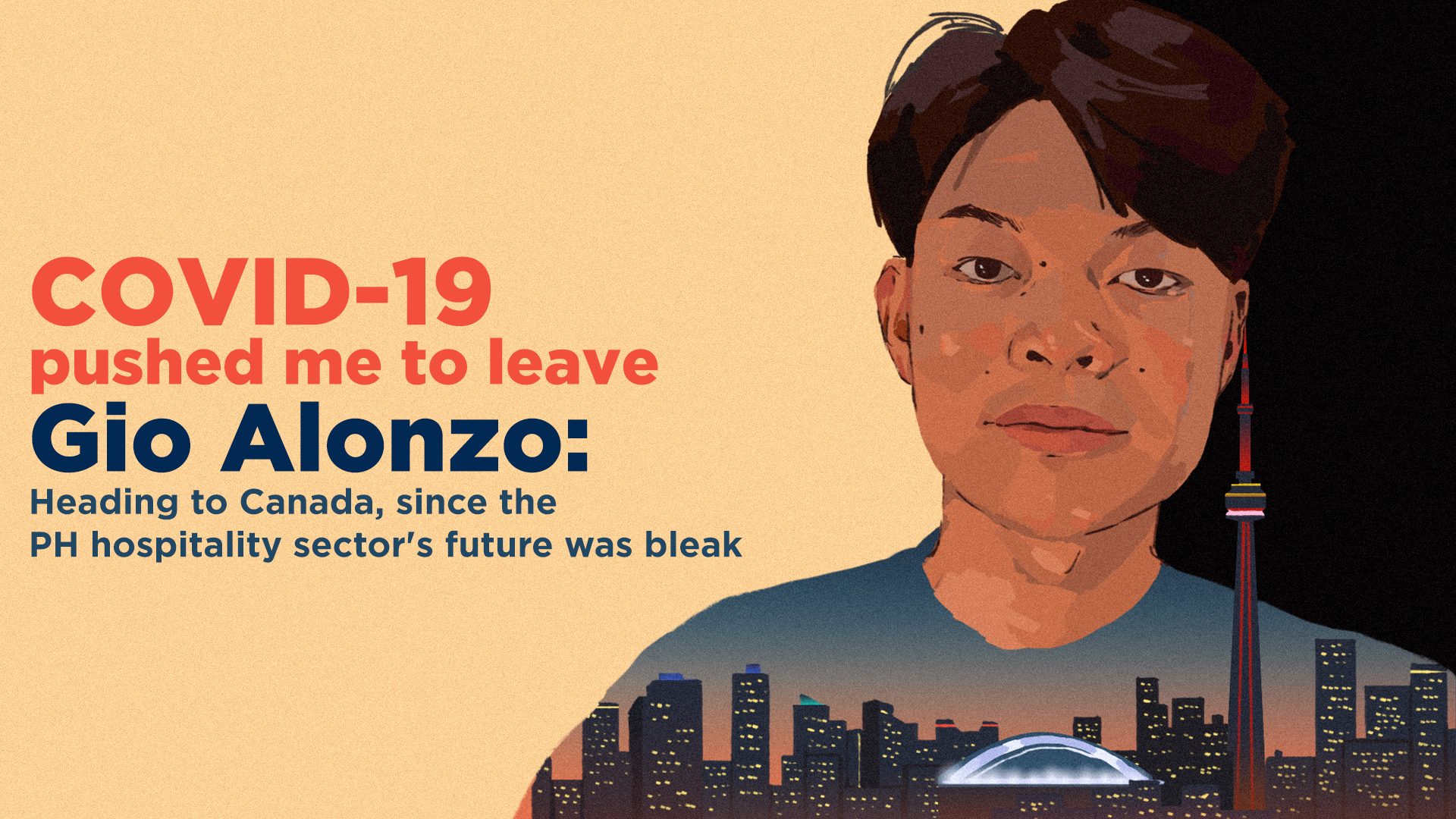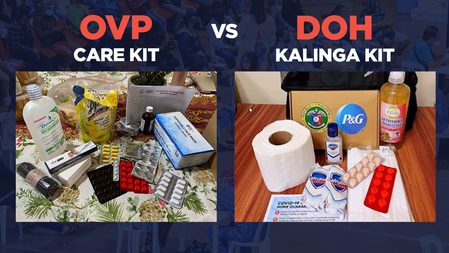SUMMARY
This is AI generated summarization, which may have errors. For context, always refer to the full article.

This story is part of COVID-19 Pushed Me to Leave the Philippines, a series of profiles of Filipinos who migrated out of the country during the COVID-19 pandemic.
It goes without saying that the tourism and hospitality industry took one of the biggest hits when COVID-19 struck the world. In the Philippines, where some forms of lockdowns remain in the pandemic’s third year, the sector may be put on hold for even longer.
Culinary graduate Gio Alonzo became unsure about the future of his long-term dream to own a hotel in his home country. More and more, he felt that it was time to leave.
Now in Mississauga, Canada, Gio had plans to migrate even before the pandemic, but the crisis pushed him to expedite his plans. It was not only his concern for his own future that pushed him to leave, but the sheer frustration he had with the government’s pandemic response, and the quality of life he saw that Filipinos did not deserve.
In 2020, the contribution of the tourism industry to the Philippines’ gross domestic product fell to 5.4% from 12.8% in 2019. In 2021, tourism picked up, with the Department of Tourism reporting P3.1 billion in tourism receipts generated from April to September, compared to the P1.6 billion generated in the same period in 2020.
Still, Filipinos do not know when the worst of the pandemic will be over. From December 2021 to January 2022, new daily COVID-19 cases went from hundreds to record-breaking highs of over 30,000, driven by the highly transmissible Omicron variant. The economy that had just opened was forced to fold up again, especially impacting non-essential industries like leisure and tourism.
The same may be happening in other countries, but for Gio, the risks seemed like they were more worth it in the first world.
Taste of the first world
When Gio was in college in 2018, he had the opportunity to take a year-long culinary internship in the United States. Even if it was a required internship for school, it was a job, and it paid.
In three weeks, Gio would earn the equivalent of P80,000 by assisting a chef, such as through preparing ingredients. In some ways, his earnings even “made up” for the loneliness. Finally, it was a relief to not burden his family.
“I was homesick because I missed the culture, the weather, the beach, and my friends. But when I got back, I realized that I should have done my best [to be able to stay],” he said.
Gio’s internship had delayed his graduation by a few months, and so his college batchmates had started applying for work before he did. Some sought opportunities abroad, while others tried their luck at establishments in the Philippines.
Months later, the pandemic struck, affecting the hospitality industry immediately. Gio felt the impact first through his friends’ experiences, and then his own.
“I heard from my friends that they do not get paid whenever their workplace closes down. Many of the companies do not cover their COVID-19 tests even if they were infected at work. It is such bad timing for us in the industry financially and physically,” he said.
Gio tried applying for jobs locally, but no one took him in as lockdowns were on and off. The big establishments he applied for in Metro Manila did not respond, while the ones in provinces offered lower salaries – around P18,000 a month, for example.
“Sa probinsiya, okay na ‘yun, kasi above minimum ka na doon sa suweldong ganyan. Pero kung na‘ndito ka sa [Metro] Manila, hindi ‘yan uubra,” he said. (That’s an acceptable salary in the province, because you’d be above minimum wage. But if you live in Metro Manila, that won’t be enough.)
Even small businesses prioritized well-experienced workers over fresh graduates.
The work towards migration
Watching his batchmates having better luck in countries like Australia, New Zealand, the US, and Canada, Gio thought to choose where he would feel the most at home. Canada was where he had the most relatives, so even if he would feel homesick, it would be less than if he were alone.
His minimal work experience lowered his chances at scoring a work visa. He followed the strategy – or diskarte – of his batchmates, which was to enter the country as an international student. This would become his pathway to permanent residency.
Gio had been accepted to a program that offered a diploma in hospitality management in Ontario as early as 2019, but it was acquiring the visa that pushed his departure back for two years. Securing his requirements was not seen as an essential purpose by the men in uniform enforcing the hard lockdown in the early months of the pandemic.
Meanwhile, because of the hefty immigration costs and the guilt of still relying on his parents, Gio put up a home-based food business. With this, he could also practice his profession while waiting for his visa, he thought.
The one-man business took off with hundreds of followers on social media and a wealth of positive reviews for his savory pastas and rich cookies and cream puffs, crafted with culinary techniques he learned in and out of the country.
Finally, after an initial rejection from the Canadian government due to insufficient requirements, Gio was cleared in May 2021 to study in Canada.
“I was so excited to leave the country because I was just doing what I could to get by. I knew this was not the life I wanted for myself. My earnings broke even a lot,” he said from his room in Mississauga.
“Here, even if you do less [than how I worked in the Philippines], you still get paid enough. Unlike in the Philippines, you have to give more just to get paid enough.”
His final months in the Philippines were spent preparing for the move, and milking his business. The business ended up contributing to a good fraction of his fees needed to pay for his travel requirements, and first semester’s tuition.
Just three days after his last order on August 8, he was on his way to his new country.
Leaving a sinking ship
While migrating was a relief, Gio looks back at what he left in the Philippines with a heavy heart. He believes President Rodrigo Duterte’s method of thinking in his pandemic response is “short-term,” and laments how Health Secretary Francisco Duque III is still in his position despite his lapses in handling the crisis.
“Halatang nagnenegosyo sila in the middle of the pandemic habang maraming namamatay. It’s almost not even the money [that dismays me], it’s about the people na namamatay,” he said, reflecting on the alleged corruption involving Pharmally Pharmaceutical Corporation’s contracts with the Duterte government.
(It’s obvious that they’re out to make money in the pandemic while so many are dying. It’s almost not even the money [that dismays me], it’s about the people who are dying.)
“If I get sick, ako lang bahala sa sarili ko. And my parents, kami lang bahala sa sarili namin (my parents and I are on our own),” he added. “I feel like the taxes I paid were not getting their worth. I don’t want to give more to the government, because they might just do the bare minimum.”
Now working part-time as a warehouse associate while studying, Gio sees himself in the near future as a front desk associate at a hotel in Canada. One day, he believes, perhaps decades from now, his dream to come home and set up his own resort could become a reality.
“I am positive that I will thrive anywhere I live, even if it’s not where my roots were grown.” – Rappler.com
Read other stories from this series:
Add a comment
How does this make you feel?






![[EDITORIAL] Apat na taon na lang Ginoong Marcos, ‘di na puwede ang papetiks-petiks](https://www.rappler.com/tachyon/2024/07/animated-bongbong-marcos-2024-sona-day-carousel.jpg?resize=257%2C257&crop=280px%2C0px%2C720px%2C720px)
![[In This Economy] Delulunomics: Kailan magiging upper-middle income country ang Pilipinas?](https://www.rappler.com/tachyon/2024/07/in-this-economy-upper-middle-income-country.jpg?resize=257%2C257&crop=421px%2C0px%2C1080px%2C1080px)

![[EDITORIAL] Marcos Year 2: Hilong-talilong](https://www.rappler.com/tachyon/2024/07/animated-bongbong-marcos-2nd-sona-carousel.jpg?resize=257%2C257&crop=136px%2C0px%2C720px%2C720px)
![[Newspoint] A fighting presence](https://www.rappler.com/tachyon/2024/07/thought-leaders-a-fighting-presence.jpg?resize=257%2C257&crop=441px%2C0px%2C1080px%2C1080px)
There are no comments yet. Add your comment to start the conversation.